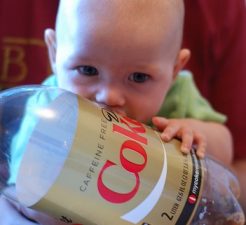 A new study suggests that introducing babies to milk before 2 weeks of age can prevent milk allergies later. “Lactavist” Hannah points out its flaws and dangers of such studies.
A new study suggests that introducing babies to milk before 2 weeks of age can prevent milk allergies later. “Lactavist” Hannah points out its flaws and dangers of such studies.
For decades, the World Health Organization and medical associations around the world have recommended exclusive breastfeeding for the first six months of a baby’s life. Breastmilk provides babies with all their nutritional needs, and contains antibodies and other substances that protect babies from infection. Numerous studies show that early introduction of formula increases the risk of illness and hospitalization. Yet when a faulty Israeli study sponsored by the Israeli Milk Council found an increased risk of dairy allergy among exclusively breastfed babies, lead researcher Jacob Katz recommended offering cow’s milk to babies within two weeks birth.
Breastmilk is natural, free and green. It’s important to consider all the facts before telling parents to go out and buy a box of expensive and highly-processed cow’s milk formula and a baby bottle, when mother’s milk is readily available.
Sharron Zabary, an researcher in the immune system at Tel Aviv University, examined Katz’s study in the Israeli site Walla and pointed out several major flaws. Funded by the Israeli Milk Council, the study looked at 13,000 mothers and babies. The mothers were asked to report–months and weeks later–the day the baby first drank cow’s milk, and any allergy symptoms that occurred in the following days.
The study concluded that the incidence of dairy allergies was nineteen (!) times higher among exclusively breastfed babies or babies who received supplements after two weeks of age, than in those who received supplements in the first two weeks.
The medical literature reports an incidence of dairy allergy of one to three percent among babies exposed to cow’s milk formula, compared to only 0.5 percent among exclusively breastfed babies. But Katz’s study found a 0.5 percent incidence across the board. Since the study relied on post-partum mothers to recall, weeks later, the exact date their babies first received cow’s milk formula and subsequent allergic reactions, it’s likely that much of the data was flawed.
Even more confounding is that the study did not consider supplements in the hospital stay after birth, where most babies end exclusive breastfeeding with a bottle of cow’s milk fed them by a nurse.
We should be especially wary when companies that promote cow’s milk and baby formula get involved in breastfeeding studies. Even in the unlikely case that the study’s results turn out to be accurate, Katz’s recommendations ignore the many proven risks of early introduction of formula. Dairy allergy is rarely life-threatening and usually passes after a year of age, while gastro-intestinal infections, a common result of early supplementation, can lead to serious illness or even death.
More Green Posts on babies:
Breastfeed Your Baby in a Hijab: Public Breastfeeding in the Middle East
Maccabee Health Fund Undermines Babies’ Health
Avoid These Common Misconceptions When Breastfeeding Your Baby



